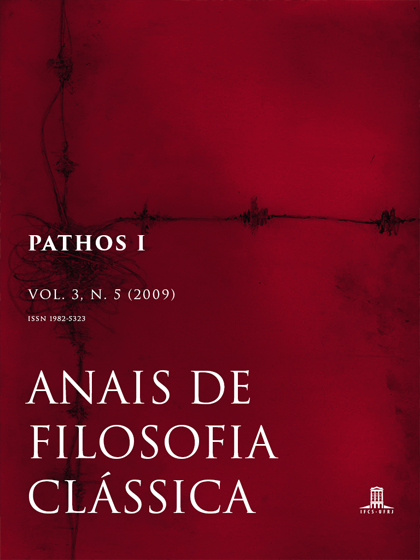O páthos ético
DOI:
https://doi.org/10.47661/afcl.v3i5.16968Palabras clave:
emoções. educação. ética. Aristóteles. Martha Nussbaum.Resumen
Resumo:
Atribuímos comumente às emoções um papel secundário no julgamento sobre a ação correta. Inclusive, muitas vezes acreditamos que as emoções ‘atrapalham' o julgamento correto. Martha Nussbaum mostra-nos ao longo de sua obra, da qual destacamos The therapy of Desire e The fragility of goodness, que nos precipitamos ao excluir elementos cognitivos das emoções. A partir da leitura da obra ética de Aristóteles e da obra dos estóicos e epicuristas, Nussbaum argumenta em favor de uma compreensão cognitiva das emoções. Estas surgem motivadas por crenças. Cada cultura forma seu cabedal de crenças básicas a partir das quais os indivíduos forjam suas emoções. Assim, por exemplo, para um grego antigo a visão de um persa armado deveria despertar nele o medo ou a raiva baseado na crença de que todo persa era um inimigo dos gregos. Segundo Nussbaum, os estóicos identificavam na cultura romana uma presença forte da cólera. Emoção guerreira, a cólera era um sentimento que motivava o general a entrar em um campo de batalha. Sêneca mostra, porém, como a perturbação da alma provocada pela cólera trazia desconforto ao agente. Propõe uma terapia das emoções desmedidas. Retirá-las da alma. Neste trabalho apresentaremos a análise que Nussbaum faz da parte cognitiva das emoções, baseada nos costumes, cultura e hábitos particulares dos indivíduos.
Palavras-chave: emoções. educação. ética. Aristóteles. Martha Nussbaum.
Abstract: We usually consider that emotions have a secondary role on judging which should be the right action to take in a determinate situation. Actually we often believe emotions ‘disturb' right judging. Martha Nussbaum shows along her work, from which I would like to detach The Therapy of Desire and The Fragility of Goodness, that we act too hastening when we deny the cognitive elements of the emotions. Through the reading of the ethical work of Aristotle and the works of the epicurean and the roman stoics, Nussbaum argues in favor of a cognitive understanding of emotions. These arise motivated by beliefs. Each culture builds its own group of beliefs up which individuals shape their emotions. So, for example, for a Greek man the vision of an armed Persian should arouse in him the emotion of fear or anger based on the believe the every Persian was an enemy. Accords to Nussbaum, the stoics identify in the roman culture a strong presence of anger. A warrior's emotion, anger was the sort of emotion which motivates a general to guide his soldiers in the battle field. Seneca shows, however, how the disturbance of the soul provoked by the emotion of anger represents an unpleasant state for the agent. For that reason, he suggests a therapy of emotions, which should extirpate them from the soul. In this article I will present Nussbaum's account of emotions' cognitive side.
Keywords: emotions. education. ethics. Aristotle. Martha Nussbaum.


